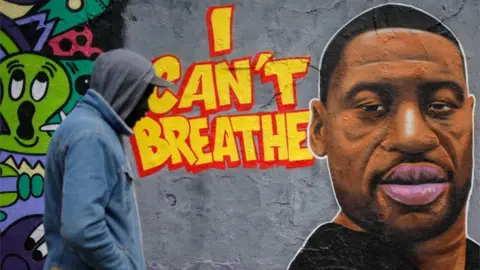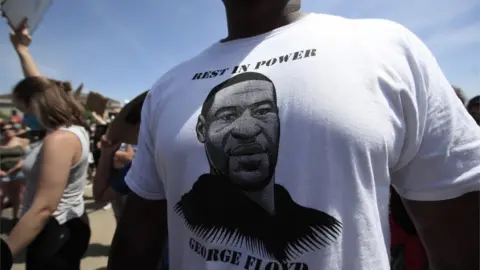George Floyd, the man whose death sparked US unrest
 AFP
AFPBefore the image of George Floyd lying under the knee of a policeman set off shock, anger and protests across the US, the arch of his life crossed crests and troughs.
There were highs, as when he, as a teenager in Houston, played American football for the 1992 Texas state champion runners-up Yates High School Lions.
There were lows, as when he was arrested for robbery in 2007 and served five years in prison.
But mostly, it would seem that Floyd, who was 46 when he died in Minneapolis on 25 May, 2020, was simply trying to live life as any other American, in search of betterment in the face of both personal and societal challenges.
His death amid a public health crisis and economic calamity that has killed more than 100,000 Americans and left over 40 million unemployed has become the latest totem of the ills that plague the country in 2020.
A native of Houston, Texas, Floyd grew up in the neighbourhood at the heart of the city's black community, the Third Ward, just to the south of the city centre.
Beyoncé grew up there, as did Bayou City's blues music scene. Drake, a Canadian rapper, paid homage to its musical vibrancy, and Floyd himself is thought to have 'spit bars' as part of the hip-hop group in the 1990s in Houston.
But poverty, racial division and economic inequalities mark its history, too, as with any American city. Marred by segregation in the 20th Century, the Third Ward Floyd left in recent years has seen gang violence and tensions over housing.
"Anytime I take somebody who's not from there, people actually are like 'man, oh my God, I've never seen poverty like this.
"It looks like a bomb went off, what happened?'" Ronnie Lillard, a friend from the neighbourhood tells the BBC.
"People are still living in shot-gun shacks that were erected in the 1920s. The poverty is thorough... and being from that area, it's hard to escape," says Mr Lillard, a rapper who performs under the name Reconcile.
 European Photopress Agency
European Photopress AgencyFloyd was well known in the council estate housing project, Cuney Homes, he adds. "Cuney Homes is known as 'The Bricks' and if you're from there they call you 'a brickboy'. He was a brickboy."
Growing up a gifted athlete standing at six feet six inches, friends who knew Floyd as a teenager described him as a "gentle giant" who shone on the field in two sports, basketball as well as American football.
"I was blown away, cause at 12 years old he was six-foot-two," Jonathan Veal, a childhood friend and former teammate, told local media. "I had never seen anyone that tall before".
At John Yates High School, he wore number 88 in the tight end position for the football team, and was later recruited to play basketball at South Florida State College in Avon Park, Florida, where he was a student from 1993 to 1995, according to CNN.
He returned to Texas for a school year at Texas A&M University, Kingsville, but did not complete his degree.
His life then took a different turn, with a string of arrests for theft and drug possession culminating in an armed robbery charge in 2007, for which he was sentenced to five years in prison.
He became involved in his local ministry, Resurrection Houston, after his release and was intent on making changes in himself and his neighbourhood, says Mr Lillard.
"While he was embracing his own life change, he was looking around at his community."
A video of Floyd decrying gun violence, believed to be filmed in 2017, has circulated on social media, in which he implored young people to "come home".
His family told the Houston Chronicle he moved to Minnesota in 2018 after being encouraged by friends through a Christian work programme.
Christopher Harris, a friend and former classmate, told US media Mr Floyd "was looking to start over fresh, a new beginning".
"He was happy with the change he was making," he added.
The former athlete found work as a security guard at a local Salvation Army charity, and then took on jobs as a lorry driver and dance club bouncer at Conga Latin Bistro, where he was known as "Big Floyd."
Like many Americans, however, he found himself laid off amid mass business closures resulting from the Covid-19 crisis.
On the day of his arrest, he was said to have been attempting to buy cigarettes with a counterfeit $20 bill.
Anger over Mr Floyd's death has spurred protests across the US, with some descending into chaos and violence.
Over 1,600 people have been arrested in nearly two dozen cities, and the National Guard deployed in 15 states.
Mr Lillard, who described his friend as a "person of peace", would have supported people's rights to be heard and for change, but would not have condoned the looting or the violence.
"He had a heart bent towards forgiveness, but he also was a man of the people, too," he said. "Even before his death, he was aware that people were hurting."
"I think this thing has grown into something more than George Floyd," he added, speaking of the protests. "I think you're watching frustration that America has with America [itself]."
